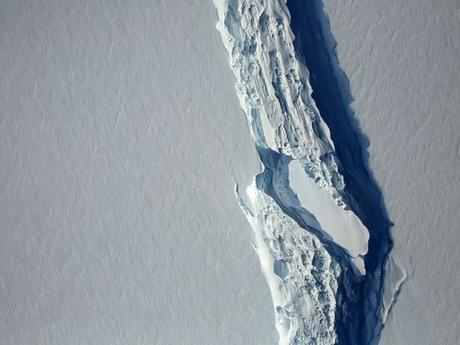 We've been talking about the possibilities for months now, but it has finally happened. A massive section of the Larsen C Ice Shelf in Antarctica has broken off and plunged into the sea, creating one of the largest icebergs ever recorded. According to reports, the giant chunk of ice weighs in at about one trillion tons and covers an area of 5800 sq. km (2240 sq. miles), which is roughly the same size as the state of Delaware.
We've been talking about the possibilities for months now, but it has finally happened. A massive section of the Larsen C Ice Shelf in Antarctica has broken off and plunged into the sea, creating one of the largest icebergs ever recorded. According to reports, the giant chunk of ice weighs in at about one trillion tons and covers an area of 5800 sq. km (2240 sq. miles), which is roughly the same size as the state of Delaware.Climatologists first warned that this large section of the ice shelf might collapse late last year, when a huge crack was discovered in the Larsen C region of the Antarctic. As researchers monitored the situation there, the size of the crack began to grow, and pick up speed. Even now, during the austral winter, the speed of grown was astounding, to the point that a few weeks back it seemed the collapse was imminent, and now it has happened at last.
It is unclear what will happen to the iceberg now. It will now move at the whims of the currents in the Southern Ocean, and will most likely begin to break up over time. It could add to the risk of ships moving through the area, as it is large enough to cause massive damage to vessels not reinforced against such hazards. Scientists say the ice could remain in the waters off Antarctica for decades, while other parts will drift north into warmer waters and eventually melt.
Of larger concern is what the loss of this chunk of ice means to the health of Antarctica. The ice shelf has always served as a barrier against the warmer waters of the ocean, protecting the ends of glaciers. Now, that barrier is gone, and we're likely to see the glaciers there begin to retreat at an accelerated rate, with more ice calving off into the Southern Ocean, which could eventually lead to higher sea levels. Climate change has already had an impact on that process, and now it is probably only going to cause that to happen at a faster clip. The loss of this ice alone has reduced the Larsen C Ice Shelf by 12%.
It should be noted that researchers are quick to point out that temperatures continue to rise in the Antarctic, but that future collapses like this one still seem to be years away.

